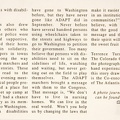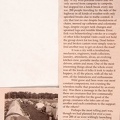Volume 20 No. 1
A Publication of ADAPT
Winter 2003-2004
[Headline] Ain't Gonna Let Nobody Turn Us Around
[Subheading] Gonna Keep on Marching... Marching on to See MiCASSA Pass
Why are we doing this? It's because, segregation from our society is wrong. Locking people away because they have a disability is wrong. It's almost like, we get locked away, so, it doesn't cause hurt to somebody else. You know, it hurts them to see us, so let's put us out a sight and out a mind. That's wrong. In America every-body deserves the choice and the right to be free. --Ben Barrett
For the 20th Anniversary of ADAPT folks wanted a change. As Monty Python would say "and now for something completely different..." And different it was. Amazing and beautiful. Exhausting and exhilarating. The Free Our People March and Rally was one for the history books. The March went 144 miles from Philadelphia to Washington DC, with a second wave joining us in Baltimore. The point was to focus attention on MiCASSA (S. 971/HR 2032), the Money Following the Person, and on real implementation of the integration guarantee of the Americans with Disabilities Act!
[image]
[image caption] photo by Tom Olin
[text resumes] A city of over 200 people that packed up, moved and unpacked itself every day; that was how several people characterized the Free Our People March. A city with rows of tents with wheelchair accessible 'streets" between, erected in
[image]
[image caption] photo by Tim Wheat Winter 2003-2004
[text resumes] church parking lots, state police headquarters, and open fields. A city that managed to charge over 80 motorized wheelchairs off a generator every evening so they could make the 10 - 16 miles of marching each day. A city with portable toilets that not only moved from campsite to campsite, but stopped for a lunch break every day too. 200 people traveling by the side of the highway in all kinds of weather with only specified breaks due to traffic control. A city that lost no one despite breakdowns of chairs, messed up catheters and colostomy bags, despite oxygen tank changes and sprained legs and terrible blisters Even Erik von Schmetterling's stroke or a couple of other folks hospital visits could not hold the group down for too long. Dead batteries and broken casters were simply tests to find another way to get on down the road!
It was a city with a troubadour, mechanics, engineers, trash collectors, laundry, attendants, divas, an evolving kitchen crew, portable media station, drivers, artists and more. One of the most interesting things about the whole event was all the kinds of folks it took to make it happen, in all the places, with all the talents, all the limitations and enthusiasms.
Wild geese and bees were our most constant companions, not counting the relentless traffic that pounded by us every day. Was there a message in the fact that these are creatures that live communally and work together for the good of the group, creatures who take care of one another and each contribute to the support of the others?
Perhaps the most telling part was, though we had planned for over a year, over 200 of us were willingly launching ourselves into something we really had no idea what we were getting into Every day brought it's own set of challenges, which we met and dealt with. Trust and commitment to one another made a bond we knew would carry us through. And it did.
Weather was not particularly our friend. We started in a tremendous rainstorm with a press conference-- between the Liberty Bell and the Constitution-- right in downtown Philadelphia and in the end we headed out through rain so hard it was literally difficult to see where we were going. In Baltimore too we rallied in a dreary drizzle, and of course in DC though the rally day was lovely, a hurricane loomed over all and shut down the federal government the day were were to visit Congress! Wilmington's Rally was the exception to the rule with a beautiful day. For the most part, when it was sunny the light somehow reflected off the black asphalt of the road and burned into our skin. Sometimes it was so hot folks would literally doze off as we moved along the side of the road!
Folks flew in (a few drove) from around the country the day before we started and gathered that evening for a meeting to explain the ogistics. We would rise on a schedule, use the toilets on a schedule, march and take breaks on a schedule and go to bed on a schedule. No one was in love with regimentation, but to make it work we made concessions. When we go to Baltimore a second set of march
[image]
[image caption] Photo by Tim Wheat
[text resumes] ers joined us, and quickly got in the rhythm of it all.
The support from the public was overwhelming. All along the march people waved and clapped and stared at this bizarre apparition of hundreds of people of all abilities and disabilities--we even had a couple of athletic types in tow--heading down the highways and byways. They would come up to talk about the issues and were amazed that the bill had any trouble passing, given the logic and importance of the issue. When we stopped at night our hosts would come to visit. Some catered magnificent meals; some let us use their rest rooms (you would be amazed how good a public restroom sink and flush toilet can look!) E-mails and phone calls from across the nation sent support for the March and for MiCASSA!
The days of the march each held their own unique events: the church that could not hold us all--even dorm style--the first night (so some used tents), the 16 mile march of the second day, the Rally in Wilmington and the horrible bridge of holes on day 3, camping at the Delaware state troopers' headquarters and the McMullen-Powell family pig roast on the fourth night, the steep hills of Delaware (who knew?) and the incredible Church of the Nazareen camp with it's blocks and blocks of cabins and most hospitable staff and volunteers. The sixth day was highlighted with the shuttle over the Susquehanna River, a tremendous boost from e-mails from around the world that we read that night and the excitement of see other ADAPTers and their friends who brought dinner! Our halfway day was joyfully celebrated with a proclamation of support from Aberdeen City Council President Myra Fender and Council Member Gina Bantum and the Knights of Columbus and St. Francis de Sales Church warmly welcomed us that evening. On the eighth day the steep hills of Maryland felled many chairs but we were able to rejoin each other once we arrived at our field campsite beside the Cowenton Church in Whitemarsh. Next was our fateful night in the skating rink where we went from the fabulous feast (courtesy of the Father Robert of St Elizabeth of Hungary Church and his brother) to the sickening green mist and the incredible engineering feat of hooking up to the generator that night. Day ten our reinforcing new crew of marchers joined us for a wet rally at the Inner Harbor and went on the volunteer fire department and an al fresco dinner courtesy of the local independent living folks. By day 11 who remem-bers where we are or what's up, just keep moving and stay in line! Our biggest trial came on day 12 when a sudden rain storm soaked the chargers and the generator and tremendous effort and personal reserves were required to get even some of the chairs charged in a local fire department. The next day we arrive in DC by hook or by crook - and for some it was pretty damn crook — and were greeted by Capitol Area ADAPT with a homemade feast and a most welcoming church.
The great culmination though was coming into downtown DC the next morn-
[image]
[image caption]
photo by Tim Wheat
[text resumes] ing to the train station where the 300 Freedom Train Riders and hundreds of others joined us for our last few blocks to the rally site at the park. Entering the park and seeing the thousands gathered there to greet us was a reminder of all that went into make the march happen, both by those on the road and those not on the road with us! The party that night found new folks and old codgers, long missing faces and friends and family members reveling together amid music, pictures, and even a fill-in-your-piece-of-the- ADAPT-history timeline.
In Delaware, MiCASSA Co-sponsor Senator Biden joined us for our rally, and in DC Senators Harkin and Spector and Congressmen Davis and Shimkus, the main MiCASSA cosponsors all joined us, pledging added support. We even had Representative Dennis Moore bring his guitar and serenade the crowd with This Land Is Your Land. In Tennessee advocates were so inspired by the march they literally flooded Senator Frist's office with thou-sands of faxes until he agreed to meet with ADAPT and they rallied in Solidarity on September 17. Folks in Jackson MS and Raleigh NC, and St Louis MO held solidarity rallies too. In Chicago op-ed and letters to the editors helped spread the word.
The March was to recommit our-selves and any that would join us to the goal of passing MiCASSA, making the Money Follows the Person a reality, and to get real Medicaid reform and Olmstead implementation so that people have a guarantee to be able to choose to live in the community, in their own homes instead of nursing homes or other institutions. In the march when we left Baltimore in another blinding downpour, Anita Cameron lead us in the song 'Ain't Gonna Let Nobody Turn Me Around."
Now our challenge is to continue the push! We must push for hearings on MiCASSA by March fo 2004, for passage of the Money Follows the Person at the federal level and state by implementation in the meantime. There are there are [sic] over 350,00 people that even the nursing home industry admits want out, and that does not even address folks in other types of institutions.
If there is one lesson learned in ADAPT's last 20 years, it is that things worth fighting for are rarely won in a single round. The energy that went into the march reaped a huge harvest of commitment to these goals, but we must ensure that the harvest is not wasted.
[image]
[image caption] photo by Tim Wheat
- Created on
- Tuesday 23 July 2013
- Posted on
- Friday 27 November 2020
- Visits
- 260
- Rating score
- no rate
- Rate this photo


0 comments